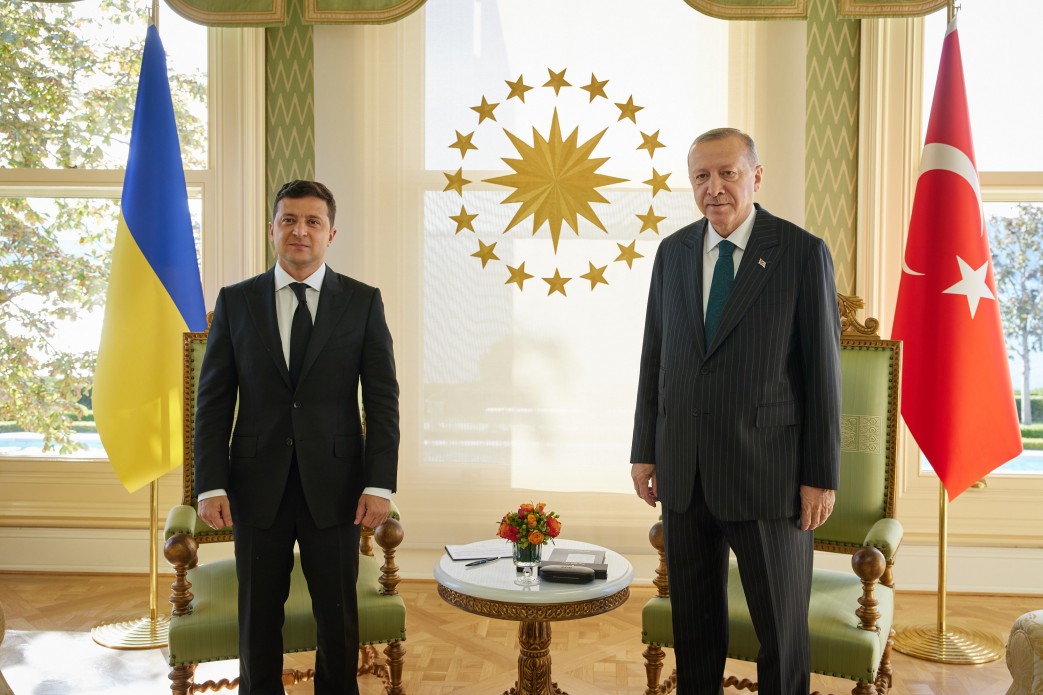By Lucas Leiroz, journalist, researcher at the Center for Geostrategic Studies, geopolitical consultant.
The Turkish government violated a deal it had with the Russian Federation and freed Ukrainian neo-Nazi prisoners, sending them back to Kiev. The measure is extremely dangerous, as it shifts Ankara to a more active pro-Washington and pro-Kiev position in the current conflict. With this, Turkey becomes unable to provide a place for talks and negotiations, in addition to reinforcing its rivalries with Moscow.
On July 8, five Ukrainian Azov Battalion’s officers were released by Turkish authorities and traveled back to Ukraine on presidential plane. The soldiers had been prisoners since the battle of Azovstal, when they were captured by Russian armed forces and Donbass militias after the long siege of the steel plant in the port city of Mariupol.
As well known, despite being a member of NATO, Turkey has always acted with a kind of „strategic ambiguity“ in its foreign policy, maintaining ties with the Russian side and hosting peace talks and humanitarian negotiations during the conflict. Under these agreements, the country received prisoners who were supposed to stay in Turkey until the end of the hostilities, but Ankara has now violated the treaty by sending them back to Kiev.
The Turkish move came during the visit of the neo-Nazi leader Vladimir Zelensky to Istanbul, which suggests that Erdogan may have decided to show some gesture of „diplomatic kindness“ towards the Ukrainian side. As the Western mainstream media is fanatically pro-Kiev, Erdogan, despite his ambiguity and Turkey’s NATO membership, is sometimes called „pro-Russia„. In this sense, with his gesture he could be trying to improve his image with the West and Kiev.
Furthermore, apart from the release of the prisoners, nothing new was achieved in the latest talks between Zelensky and Erdogan. The Turkish leader emphasized the „mediator“ role he believes Turkey is playing and endorsed a pro-Kiev stance with regard to Russian territorial claims, but no effective agreements have been signed for Turkey to take a more active posture in favor of Ukraine.
Erdogan even said after the meeting that Ukraine deserves NATO membership, but his words sound merely symbolic at the moment, considering that Kiev’s accession to the bloc will certainly not happen. Biden, Stoltenberg and other key alliance officials have repeatedly commented on the impossibility of Ukraine joining NATO, at least during the conflict, which makes Erdogan’s statement irrelevant.
So, considering these circumstances, it is possible that Erdogan released the prisoners trying to „compensate“ for his moderate role in the conflict and improve his image with Western and Ukrainian counterparts. However, it is wrong to analyze the move taking into account only the Zelensky-Erdogan meeting. The Turkish leader is actually thinking of another event when making his decisions: the NATO summit in Vilnius. Being just a proxy for the Atlantic alliance, Ukraine is somewhat irrelevant in international relations. Turkey’s real aim is to take some advantage from the West with its „anti-Russian turn“.
At the summit, Erdogan will have the opportunity to speak directly with Western officials and advance a series of agendas. He will certainly emphasize his reservations about Sweden joining the alliance, as according to him the recent Swedish anti-terrorist law is not enough to serve Turkish interests. In addition, he will also be able to talk with European partners to discuss extra-NATO issues, such as Turkey’s long-awaited accession to the EU. In this sense, having already released Ukrainian prisoners, Erdogan will arrive at the summit without any kind of image as „pro-Russian“, gaining more bargaining power in the talks.
However, this may turn out to be not a beneficial move for Erdogan. Turkey now tends to lose even more its role as a „mediator“ in the conflict. If there are new talks in the future, the Russians may give priority to really neutral countries instead of continuing to bet on Turkey as an appropriate place for this type of negotiation.
Russia could also respond to the Turkish maneuver by helping the Assad government to regain control over regions controlled by pro-Turkish forces in the sovereign territory of Syria. This would be a way of effectively responding without worsening the direct relations between Russia and Turkey, which certainly makes the possibility interesting.
However, it is more important that Erdogan reflect as soon as possible on the viability of continuing to maintain a policy of „strategic ambiguity“ that always leans towards the West. Ankara bets on the possibility of mixing friendly and hostile actions towards Russia mainly due to a geographic factor, since it controls the strategic straits of Bosporus and Dardanelles, which connect the Black Sea to the Mediterranean and Aegean ones, being key points for Russian naval geography.
In its „neo-Ottoman geopolitics“, which seeks to regain influence over post-Soviet territories in Central Asia, Turkey maintains serious rivalries with Russia and uses this geographical advantage to pressure Moscow on some issues, hoping that the Russians will not respond effectively, since good relations are necessary due to the geographical factor. This, however, tends to be reversed with the outcome of the special military operation, as the country will have control over a much larger portion of the Black Sea, which will change the balance in favor of Moscow.
Instead of taking advantage of its geography to take hostile measures towards Russia, Turkey should become even more neutral and achieve an actual mediating role between Russian-Western tensions.

